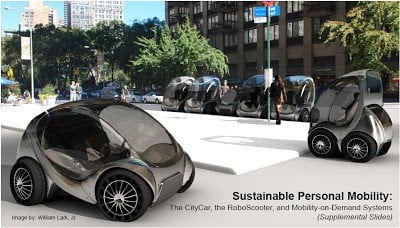
Sustainable Personal Mobility and Mobility on Demand Systems
#MoveTheDate Solutions

Personal / Community: Community project
Cities sub-categories: Renewable energy, Transportation
Description: "BFI Award ""Sustainable Personal Mobility and Mobility on Demand Systems"" 2010: This initiative includes the design of lightweight, highly efficient, electric vehicles, and encompasses the framework in which the technological innovations are integrated into the urban social and cultural environment by designing an intuitive and functional system which utilizes advanced 'smart grid' technologies. The team from MIT's Media Lab have designed several new battery-electric vehicles – the CityCar, the RoboScooter, and the GreenWheel electric bicycle – that are utilized within mobility-on-demand systems. All of these vehicles are extremely lightweight, have small footprints, have no tailpipe emissions, and are extremely frugal in energy use. This is accomplished without compromising safety, comfort, convenience, or fun. Our team has finished conceptual design for both the electric vehicles and the mobility-on-demand system. We are now engaged in the design development and have produced working prototypes for each of the vehicles including: 1. CityCar – Full-scale working prototype of the chassis. 2. RoboScooter – 2 show car quality full-scale prototypes, the first of which was showcased at the Milano Motorcycle show in November 2007. 3. GreenWheel Bicycle – Full-scale working prototype showcased at the Copenhagen conference on SmartBiking (prelude to the November 2009 U.N. Conference on Climate Change). We have researched the top vehicle sharing systems in Asia, Europe, and the US and closely examined the world’s largest mobility-on-demand system, the Paris Vélib bicycle system, which employees over 20,000 bicycles and 1200 racks. This has allowed us to distill a best practices strategy for implementing a profitable and sustainable transportation system including sizing of the fleet, station placement, maintenance, and fleet logistics. We have also developed a system dynamics model which anticipates user demand and optimizes the vehicle supply chain. Our team has engaged in discussions with the political leaders of San Francisco, London, Florence, Lisbon, Taipei, and Bangalore and has developed implementation plans for these cities. We have also created business models that account for the implementation and initial rollout, marketing, system growth, maintenance, and overall economic sustainability. We will utilize the prize money for technical development and business modeling as a basis for pursing venture capital. Phase 1 implementation includes a pilot on MIT and Harvard’s campus, with the purpose of testing our system in a manageable area where we can learn and improve the system before full-scale deployment. The pilot including planning and implementation will take 2 years. The 3rd year will be devoted to city-scale deployment in of our candidate cities (mentioned above). "
Website about this solution: http://smartcities.media.mit.edu/
Video about this solution: https://vimeo.com/274802730
Why I love this solution: These systems are highly efficient in reducing urban congestion, energy use, and carbon emissions. They are synergistic with ubiquitous wireless networking and distributed intelligence, and with solar-friendly, wind-friendly, fuel-cell-friendly smart electrical grids. There are some attractive business models for their introduction, and the political and economic climate is increasingly propitious.